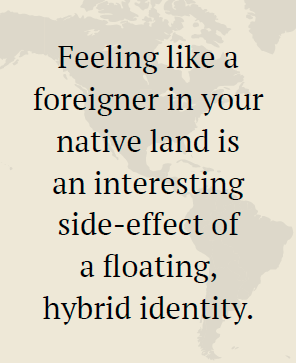FIRST PERSON | When Strangers Ask Me

I tend to cringe when strangers ask me where I’m from. In that split-second, my tongue turns into a spring mattress in bad need of oiling, creaking with strain as I get ready to answer. In revolt, even my voice cracks at the summons. A simple answer reverberates like a lie through my senses even though I’m not, in what constitutes a genuine lie, lying at all. Still, in spite of my intent, a single place answer is bound to come out as a stumpy truth.
When the question is, “Where were you born?” (which hardly anyone ever asks, though it’s perfectly direct), the answer flows easily: Brazil—the land of copper earth, childhood memories, and volatile, rusty democracy. I spent my early years in the country and had always longed to return someday. So I did. I’ve been back in Brazil for more than five years now, which is turning out to be a lot more complicated than I had imagined. Feeling like a foreigner in your native land is an interesting side-effect of a floating, hybrid identity.
When asked, “Where did you grow up?” I say the United States—as much as Georgia, Utah, and California can be viewed as a place. Whether it is an omission not to mention the extended summers in Brazil and Southern Europe towards the end of my adolescence or the eight years in Central and Eastern Europe after college, I don’t know.
Now, if the question is (as it so often is), “Where are your ancestors from?” thfen I’m almost totally at a loss. Like most Brazilians, I’m not quite sure who frolicked with whom under the gauzy sway of the tropics. Asking would somehow seem like either prying, as if investigating my grandparents’ rate of intercourse, or otherwise be sure to arouse suspicions as to my motives.
 There’s a saying in Portuguese, put in song by renowned singer-songwriter and author Chico Buarque, that goes, “Sin does not exist under the equator.” This pretty much sums it up for me. In a country where the melting pot has long been a palpable reality and not just fodder for politicians, though it is that at times too, the subject of origins seems almost quaint—the stuff of tea parties in nineteenth-century drawing rooms.
There’s a saying in Portuguese, put in song by renowned singer-songwriter and author Chico Buarque, that goes, “Sin does not exist under the equator.” This pretty much sums it up for me. In a country where the melting pot has long been a palpable reality and not just fodder for politicians, though it is that at times too, the subject of origins seems almost quaint—the stuff of tea parties in nineteenth-century drawing rooms.
There is, however, a verifiable Portuguese branch and with it, my Iberian looks to “prove” it. So, to simplify matters, should I say that I’m Portuguese? That I come from Portugal? Can I wear the “Made in Portugal’ label, confident that I’m not misrepresenting myself? I’d hate to overlook the offshoots—incognito sprouts though they may be.
I’ve been to Portugal, and though I saw myself in many of the faces there, I felt more at home in Greece, where some inhabitants were also anxious to claim me as their own. Did an oracle inform the old woman (who remained unconvinced I didn’t speak Greek) that I was a spurned daughter of Tyche, the goddess of luck and fate? That would explain a lot.
At this point you might be wondering why I’m not perfectly content with saying I’m Brazilian—a good, logical conclusion since a) I was born there, and b) the country’s very fluidity of origins seems to resolve the issue. And I do, I say I’m Brazilian, which most of the time caps it, save for the pesky skeptics who engage me in trivia about football, bossa nova and samba, Rio de Janeiro, caipirinhas, supermodels, corruption, and crime.
Except for the musical element and the caipirinhas, my knowledge of any of the above-mentioned topics is culled mostly from the New York Times. I’ve never had any interest in football, for example. Every time I’ve sat down to watch a match, I lost track of the goings-on of the ball after the first five minutes or so—and that’s when I’m concentrating. If I do end up watching, that is if I’m among the watchers, it’s because of all the euphoric hoopla over it, which I hope will be contagious enough to get through my usual malaise around sports in general.
As for Rio, my favorite neighborhood is tucked in the mountains among ateliers and exuberant foliage, where a cable car famously coursed through it. I paraded down the Sambadrome once, the Carnival “runway,” as part of a theater group’s school, clad in a ballooning costume with a humongous, itchy papier-mâché fish on my head. I tripped, slipped, and fell in my half-mile attempt at doing something really Brazilian—probably a whim of Tyche, that sadistic sphinx. This is not to say that I disavow myself from Brazil—and Brazilian-ness, whatever that would entail; quite the contrary.
I recall jazz dance lessons in urban, ecologically minded Curitiba, where I lived for some time as a child; the ocean going to greet what we called the red-tinged lagoon once a day in a remote village; bucolic misty farms with their undulating mountain horizons; children of the sixties passionately discussing Marxism over a grilled-cheese sandwich and a cafezinho; having interminably stimulating conversations with countless nameless philosophers as the sun rose and set to the tune of bossa nova or electro-bossa-pop.
When others, especially Brazilians, accuse me of trampling over its culture in favor of “foreign influences,” I guffaw. In a hybrid culture—oh, let’s face it, world— appropriation is inevitable; liking or not permutations of a “distinctly national landmark,” as in the case of electro-bossa-pop, is a matter of taste, not of judgment. I say this as so often I’ve heard disdain for those dabbling into electronica, hip-hop, or even Baroque music. The irony lies, of course, in that in trying to dictate what constitutes a national identity, it erodes the very thing on which it prides itself: a seamless flow of cultures and forms.
